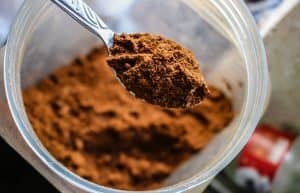 There’s a lot of buzz about using protein powder drinks as part of your fitness program. There’s also a lot of discussion on whether they’re necessary or even healthy for you. Just what is a protein powder drink and what are the benefits? Protein powder can come from milk, eggs or a vegetarian option such as rice or soy. Most have added vitamins and minerals with thickeners, flavoring and sometimes, added sugar to make them more palatable. Simply add the powder to a smoothie or just add water or milk for a boost of protein into your diet.
There’s a lot of buzz about using protein powder drinks as part of your fitness program. There’s also a lot of discussion on whether they’re necessary or even healthy for you. Just what is a protein powder drink and what are the benefits? Protein powder can come from milk, eggs or a vegetarian option such as rice or soy. Most have added vitamins and minerals with thickeners, flavoring and sometimes, added sugar to make them more palatable. Simply add the powder to a smoothie or just add water or milk for a boost of protein into your diet.
Protein powder isn’t the alternative for a healthy diet.
Sometimes, you need a boost of protein, such as if you’re building muscle and have increased your strength building workout, are recovering from an injury or are following a vegan or vegetarian diet and find it hard to consume enough protein to be healthy. If you’re getting adequate protein in your diet, but find you tend to miss meals, a protein shake with added fruit and vegetables can fill in the gap and provide other nutrients quickly.
How much protein do you actually need?
The body requires a certain amount of protein to build all cells in the body and repair tissue. It’s in hair, nails, blood, skin, muscle, bones and cartilage. Lack of protein can affect all parts of the body and every function. There are serious consequences of too little protein, but also from too much. Protein is in many different types of food from eggs, meat and dairy to soy, broccoli and nuts. You need approximately 0.36 grams of protein for each pound of body weight.
There are a lot of variables and too much protein can cause problems, too.
The more sedentary you are, the less protein you need. The more muscular you are, the more you need. A lot of things can increase or decrease your need for protein. One thing is certain, you can get too much. It’s hard on the kidneys if you eat too much protein, since the kidneys break it down. They need water to do that and that leads to dehydration, too. Protein powders aren’t regulated either. Some contain high amounts of sugar, others are contaminated with pesticides, heavy metals and contaminants from unclean conditions.
- The type of protein powder you use makes a difference. If you’re lactose intolerant of have a food allergy, you could experience symptoms from gas and bloating to a far more severe allergic reaction.
- People with difficulty eating enough or an impaired appetite, such as chemo patients or older individuals, may benefit from additional protein, just as those who require additional protein to heal a wound.
- If you’re consuming supplements like protein powder, instead of real food, you’ll miss out on the micro nutrients and phytonutrients found in the whole food. Often the nutrients found in real food work in synergy to provide more benefits.
- If you’re trying to lose weight, protein powder may help you shed weight. Protein fills you up and leaves you feeling full longer.
For more information, contact us today at Ironfit San Antonio
